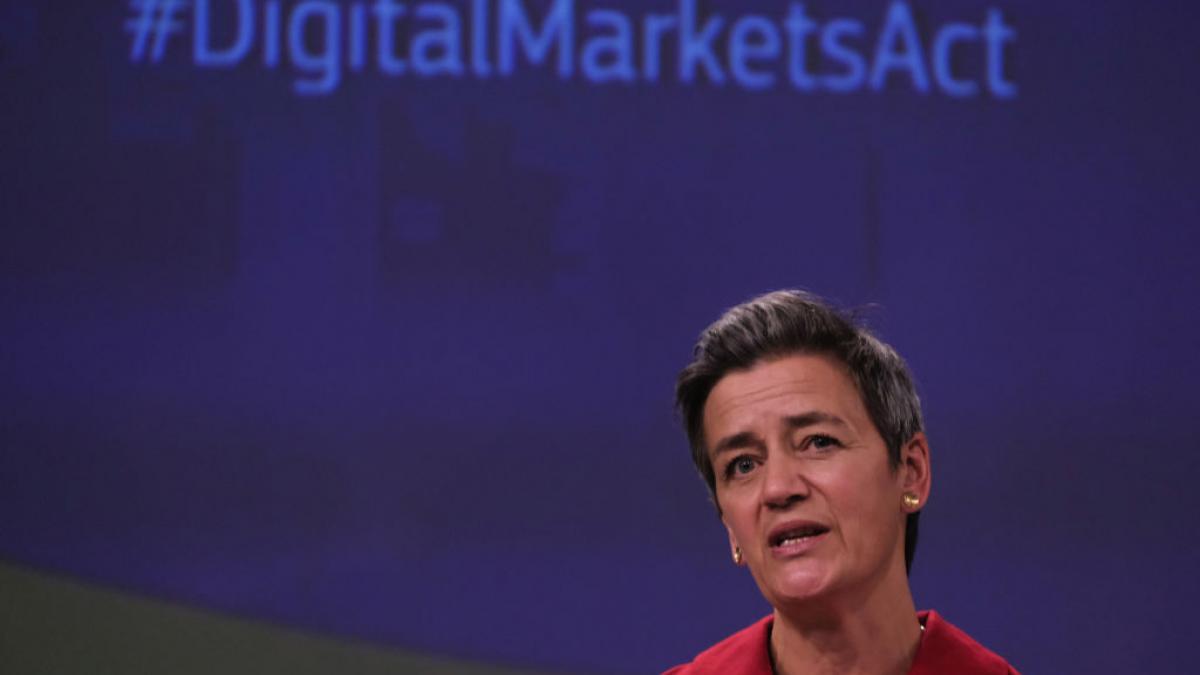Insights for successful enforcement of Europe’s Digital Markets Act
The European Commission will enforce digital competition rules against big tech; internally, it should ensure a dedicated process and teams.

The European Union’s Digital Markets Act, agreed in principle at EU level in March 2022, will give the European Commission new enforcement powers that could shape the business models of some big tech companies. The Commission will oversee 21 new competition rules that an estimated 14 digital ‘gatekeepers’ – platforms such as Google and Microsoft that business and consumers find it hard to avoid – must adhere to. The new rules deal with various digital issues in a borderless digital economy and will have potentially global ripple effects. How the Commission organises itself as an enforcer of the new rules will therefore be widely watched. The Commission must define how to implement the rules and will need sufficient resources and skills, plus external cooperation with other jurisdictions and digital regulators, to deal with the intense workload.
Internal implementation
The Digital Markets Act (DMA) is an initiative of the Commission’s digital policy department (DG CONNECT), rather than its competition department (DG COMP). However, DMA rules draw from past and current competition cases. The Commission must therefore define an internal setup involving both departments, to allocate the skills and resources that will ensure that gatekeepers comply.
The Commission and 'gatekeepers' will also have to cooperate in the context of a dialogue to secure effective compliance. Although the dialogue isn't mandatory, it might give gatekeepers a greater chance to comply with DMA rules. Without dialogue, the risk of non-compliance is higher and there could be a greater chance the gatekeeper will seek legal redress against a Commission’s non-compliance decision. However, dialogue will take place on a case-by-case basis and will be time-consuming because of the need to conduct market investigations and get feedback from market participants. Gatekeepers might also try to influence the Commission to act in their favour due to close relationships with regulators and asymmetric information.
Against this backdrop, the Commission should issue guidance to clarify how gatekeepers should comply with the rules. This approach will ensure greater legal certainty and will be less resource-intensive and time-consuming for both the firms and the Commission. It will also reduce risks of gatekeepers securing undue influence over the Commission, as it will reduce the need for case-by-case discussions between the Commission and gatekeepers.
Nevertheless, dialogue might still be necessary in some cases to tailor measures to the business model’s needs – relating to specific privacy and security features of platforms, for example. In this case, the Commission should change its team frequently to avoid the risk of complacency during the dialogue while ensuring safeguards against ‘a revolving door’ between gatekeepers and the Commission, if these aren’t already in place.
Dedicated teams
DG CONNECT does not have competition-related expertise and will thus need DG COMP's resources and expertise. This requires allocation of work between monitoring and enforcement teams. Whether the DMA achieves what it is meant to achieve depends critically on the enforcement team, and less on the monitoring team, because without proper enforcement, the regulation is a dead letter. The enforcement team's resources and skills will therefore be the key to an effective DMA.
Allocation of work between monitoring and enforcement teams
DG CONNECT and DG COMP implement, respectively, digital policies and competition policies. DG CONNECT is thus best placed to define competition rules to achieve digital goals, while DG COMP is best placed to enforce them. Therefore, DG CONNECT should provide the DMA monitoring team as it has digital strategy expertise. DG COMP should provide the DMA enforcement team because it has the experience of dealing with digital antitrust and merger cases. The two teams should frequently exchange information, including confidential information, to ensure proper enforcement and consistency.
Resources and skills of the enforcement team
The Commission already has 70 people it can call on to assemble an enforcement team in its IT (13), DMA policy task force (6) and digital antitrust (51) units.
Figure 1 shows their skills. Excluding administrative staff (13%) and staff without public background information (30%), most have a background in law (68%). Others have backgrounds in law and economics (10%), economics (8%), informatics (5%), politics (5%), mathematics (3%) and international business (3%). A clear majority have expertise in competition (88%), while other areas, such as data science or data protection, represent only minor knowledge areas.
The Commission estimates that DMA enforcement requires a budget of around €81 million and the redeployment of 80 staff over 2021-2027 (scenario 1). Internal Market Commissioner Thierry Breton expects up to 120 employees (scenario 2), and DMA rapporteur for the European Parliament Andreas Schwab argued for 220 employees (scenario 3). Table 1 shows the total budget necessary for each scenario.
Table 1 also states the DMA enforcement budget in each scenario as a percentage of the gatekeepers' global turnover (under the definition of a gatekeeper agreed by the EU in March, and using the latest data for the same pool of companies in a previous Bruegel assessment, we assess the firms likely to be designated as gatekeepers as: Airbnb, Alphabet (Google), Amazon, Apple, Booking Holdings, Meta (Facebook), Microsoft, Oracle, PayPal, Salesforce, SAP, Uber, Verizon (Yahoo) and Zoom).
Table 1 also shows the number of staff per gatekeeper and rule. The Commission will have to enforce 21 rules for an estimated 14 gatekeepers, though some rules will only apply to some gatekeepers because of their different business models. The staffing scenarios imply, respectively, 0.3, 0.4 and 0.7 employees per rule per gatekeeper, while enforcement budgets would be equivalent to 0.005%, 0.008% and 0.015% of gatekeepers’ global turnover. The resources that the Commission is allocating to enforcement are much smaller than the resources gatekeepers have to comply with the rules.
Each of the three scenarios thus represents only a tiny proportion of the gatekeepers’ financial resources and implies an allocation of less than one employee per gatekeeper per rule. This may prove to be too little in the face of the complexity and speed of digital markets and the deep pockets of gatekeepers to contest the regulation before the Commission and the courts. The Commission should thus consider increasing its budget to a level it can reasonably afford. For illustrative purposes, Table 1 includes a fourth scenario: a budget equivalent to 0.04% of gatekeepers' revenues would allow for two employees per rule per gatekeeper, and would give a budget of €613 million and 605 staff.
The Commission has not specified further the skills required from enforcement staff. However, the DMA deals with competition and data protection issues as well as informatics issues related to access to gatekeepers and their data. Moreover, enforcement will require access to data and algorithms. Based on the current staff proportions, and scenario 4 for the total number of staff, the team’s composition to enforce the DMA would be around 30 informaticians, 408 lawyers and 106 economists with a background in economics or law and economics. Note, these proportions might not accurately reflect the current staff composition due to a lack of complete information on staff backgrounds. There should be a significant number of informaticians in an ideal composition to meet the IT requirements, especially to reduce information gaps between the Commission and the gatekeepers by frequent access to data and algorithms. There can be fewer lawyers as the regulation does not require in-depth analyses on a case-by-case basis, as is the case in competition law.
Some lawyers will need to have a background in both competition and data protection to understand competition issues related to privacy. Some economists will need to have a background in the business of platforms and in behavioural economics to understand how platforms work and how they interact with their users. Lastly, some informaticians will need a background in data science and artificial intelligence to analyse data and algorithms, while others will need a systems or software engineering background to examine how the implementation measures work.
External implementation
Cooperation with other digital policies
The DMA will not work in isolation but will have to work alongside other digital policies. Several European bodies dealing with digital issues, including telecommunications, data protection, consumer protection, competition and the audiovisual media, might advise and provide expertise to the Commission in enforcing the DMA. These bodies should also cooperate and share information and enforcement expertise to ensure effectiveness, efficiency and consistency of the various digital policies. The group should follow the example of the Digital Regulation Cooperation Forum (DRCF) in the United Kingdom, in which the competition, data protection, telecommunication and financial authorities coordinate their actions through joint projects, approaches and teams. This will prevent duplication while ensuring consistency and efficiency.
Cooperation with other countries
The DMA will also exist alongside frameworks in other countries that are developing similar rules, including the United States, the United Kingdom, Australia, Canada, China, South Korea, Turkey, Italy and Germany. Given that gatekeepers implement similar practices globally, each jurisdiction might have an extraterritorial impact.
EU countries can complement EU laws without countering them according to their preferences, but this might lead to inconsistency and higher compliance costs. For instance, Germany enacted in 2021 a DMA-like competition law that prohibits some large online platforms from behaving in a certain way. Gatekeepers under the DMA are also likely to fall under German competition rules; some, including Alphabet, Meta, Apple and Amazon, are currently under investigation in Germany. The Commission and EU countries should thus cooperate actively and exchange information through the existing European Competition Network (ECN), to enforce the DMA and national laws consistently. The ECN should define a case-allocation mechanism in which the Commission is the sole enforcer of the DMA, with the option to delegate some DMA-like cases to EU countries under their national competition laws, when they have the resources and skills.
The Commission should also cooperate and coordinate with non-EU countries. At the enforcement level, the Commission will need to use existing legal instruments for international cooperation, such as confidential waivers, with competition and non-competition regulators. It will have to exchange systematically before the opening, during and at the end of investigations. Currently, regulators frequently exchange views during competition investigations, but less so before and at the end of investigations (Figure 2).
Pre and post-investigation exchanges will be key in digital markets to ensure duplicated resources are not allocated to similar matters before opening a case, and to define common remedies at the end of an investigation (of course, information exchange poses legal and trust issues beyond the scope of this article). Lastly, cooperation could be bilateral, or multilateral through international forums including the Organisation for Economic Cooperation and Development and the International Competition Network.
Recommended citation:
Carugati, C. and C. Martins (2022) ‘Insights for successful enforcement of Europe’s Digital Markets Act’, Bruegel Blog, 11 May



